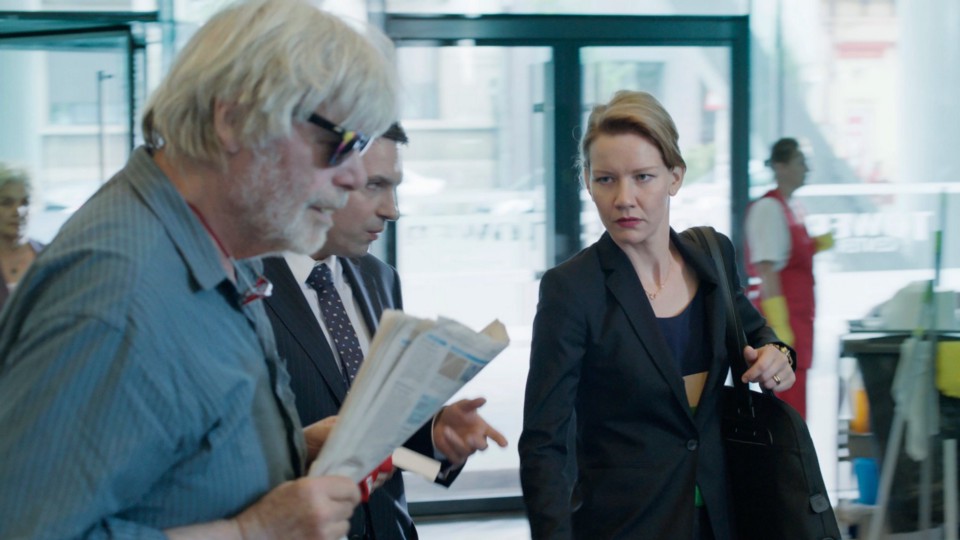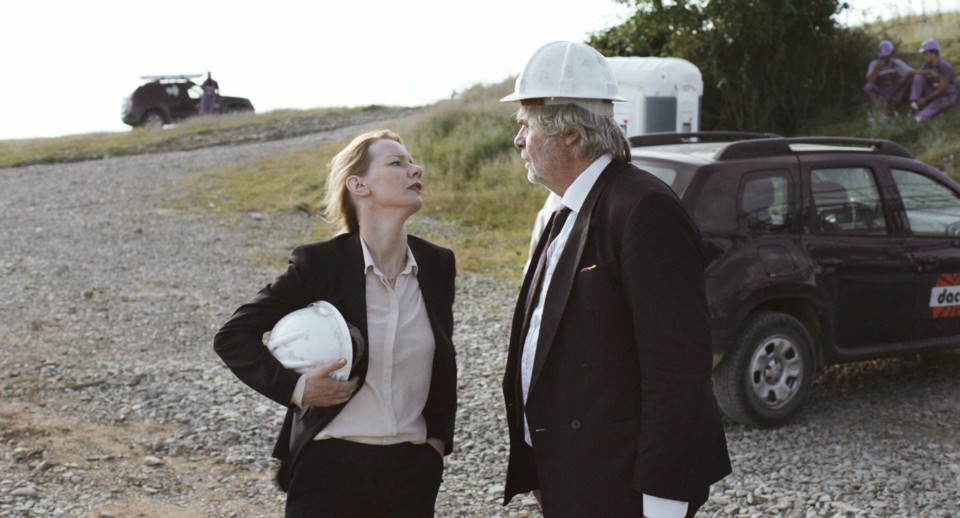There’s a strong case to be made that Toni Erdmann is the most unique film at this year’s Academy Awards.
To be sure, there are several unconventional movies nominated at the Oscars this year—a 1950s-style musical; a coming-of-age story about a gay black man; a space-race thriller centered on three female mathematicians. But Toni Erdmann, which is nominated for Best Foreign Language Film, bears perhaps this year’s most unorthodox plot: Its core emotional story prominently features whoopee cushions and a monster costume.
The film, which New York Times critic A.O. Scott called “a thrilling act of defiance against the toxicity of doing what is expected” defies simple categorization: It’s at once a comedy about intervention, a drama about a father and daughter, and a commentary on European geopolitics. After German music teacher Winfried Conradi’s (played by Peter Simonischek) dog dies, he travels to Bucharest to visit his hard-working, über-serious daughter, oil industry consultant Ade (played by Sandra Hüller) for her birthday.
A missed appointment with a client (Winfried fails to wake Ade) leads to a falling out between the two. Ade says goodbye to her father—only to meet him again in another guise.
As “Toni Erdmann,” a wealthy life coach who wears a long, dark brown wig and jagged false teeth, Winfried arrives at Ade’s office and work parties to crack jokes, surreptitiously set up whoopee cushions, give chase to his daughter while wearing a monster costume, and generally force some levity—and reflection—into her life.
The film has taken a fairly traditional route to Oscar glory for a European art film: It premiered at Cannes last spring to glowing reviews, was snatched up for distribution in the United States by Sony Pictures Classics, and became the only film from 2016 to land on the BBC’s 100 Greatest Films of the 21st Century poll. For good measure, Toni Erdmann won every major award at the European Film Awards in December.
Toni Erdmann is the first German film to make the five-film category’s cut since 2009’s The White Ribbon, and a rare German comedy to receive international acclaim. It was directed by 40-year-old Maren Ade, one of a handful of female directors whose films have been nominated this year(no women were nominated for Best Director for the seventh year in a row).
Ade’s film, a three-hour tragicomedy, is not exactly a surefire commercial premise stateside. And yet this week, The Hollywood Reporter reported that Sony Picture Classics is currently in negotiations on an American remake, reportedly with Jack Nicholson and Kristen Wiig attached (Ade and her producer will not be involved).
The ride has been a whirlwind, in a very literal sense. “I’m in the night, inside me,” Ade explains when I call her at her hotel in Beverly Hills after the Oscar nominees’ luncheon last week, apologizing for the spotty memory jet lag has left her with (in Berlin, it was 2 a.m. in the morning). She explains that she finished the film in May, five days before the premiere; since, she’s just been traveling or promoting it. “I put a lot inside Toni Erdmann,” she says.
Nevertheless, as we talk, Ade’s voice quickly transitions from sounding fatigued to impassioned—she clearly still has plenty left to say about the film and its characters.

As a several reviews have pointed out, there haven’t been many movies about adult fathers and daughters that have gotten this much attention in recent years. How did the idea originally come to you?
For me, it just came very naturally because I’m a female director. I wanted to do something about family in general, that interested me for a long time—sometimes it’s so hard to escape, and everybody plays his role. And the father-son [dynamic] is something that I don’t know enough about.
I had this story in mind where a father and daughter meet again and start from zero. And I was watching out for films that have that topic, and it’s true that they are rare—it’s often more like the side plot. But with Toni Erdmann I went back to watch some films that I liked in the past, when I was younger. There’s one film that I liked when I was a teenager called My Father the Hero (Mon père, ce heros). There’s a remake that’s been done with Gerard Depardieu—it’s not a very good film. Also, Claire Dénis had also made a very good film about a father and a daughter [35 Shots of Rum].

I did a lot more research, though, on the comedy side. For that, I watched old screwball comedies and did research on comedians. I really liked Andy Kaufman—almost everything he did I tried to find on the Internet. He had a character, Tony Clifton, that really inspired me. That character was a very bad guy, an over-the-top Las Vegas bar singer that was like the complete opposite of [Kaufman] himself. And he was very radical with his humor because he tried out his characters in real life, and spent some time in them.
It’s an interesting, deep, big topic [for me] because a father-daughter story is also always a men-women story—it’s always complicated in that sense. So that’s what I liked. But actually [the starting point] was more the idea of having a parent reconnect with his child.
You’ve said that the drama and tension between Ines and Winfried is in part a generational difference—he’s of a post-war generation, she’s a child of globalized European capitalism. When in your filmmaking process did the larger questions of Germany or Europe come into play?
It was there from the beginning. I wanted Ines to work abroad, and I’ve been interested in Eastern Europe for a long time—I like the films from there, especially the Romanian Wave films, and I found it interesting, the relationship within the European Union between big and small partners. I was looking for a country that had a very fast and also brutal capitalist invasion. After the end of Communism, everybody tried to get a slice from that cake, and so Romania provided a good background [for the story]—the city still retains the picture of this invasion, in a way.
I’m a political person myself, but I’m not interested in the type of film that makes a statement and everyone feels good after having just watched the film. For me making a film is more like posing a question. In the center of [Toni Erdmann], there was this very private, intimate part: What is our globalized world doing to our relationships? When you do a film, you hope that [below-the-surface themes] will be seen or that they will be there, even if I didn’t want to emphasize that topic so much. It’s sometimes stronger when the audience takes a question home.
Do you personally identify with either of Ines’ or Winfried’s generations, and, if so, did you find it harder to confront the faults of one versus the other while you were writing?
The film, for me, is like a little homage to [Winfried’s] generation, which I feel was idealistic. They had a clear enemy, especially in Germany—the generation before—but also they were more political and there was still hope that things could be solved very fast. Today, everything is more complex—it’s so complicated who to blame for what. But still, today, when we look at the political situation we realize—or my generation realizes—that what our parents were fighting for, we cannot take that for granted. It’s an ongoing process, realizing that. “Ah, OK, feminism, it’s still a pressing topic?” “Yeah.”
Winfried’s like a sinking island, a place that we’re longing for and will be gone soon. Ines is part of the next generation, who has some nihilistic tendencies sometimes, and that’s not the right [mindset], I think.
The portrayal of Ines’ role in the workplace seems to me like it only could have been written by a woman. She’s at once incredibly capable, and yet molds a great deal of her behaviors to what she believes her male bosses want. What informed your approach to writing about her career?
Just taking a woman and putting her into that job, I was aware that this is already maybe a statement. For me, sometimes it felt strange. I’m also a woman, working hard, but still, in a film, it means even more. How do I deal with the topic of a woman in the workplace, especially when Ines is working in a male-dominated environment, surrounded by sexism that is definitely there?

In the research, there was one point where I met a lot of businesswomen. It was surprising for me that a lot of them, it was nice to be among men. But a lot of them, the higher they climbed, they realized that, at a certain point, there’s a change, and they have to make it themselves: either to stand up more for what they really want, or to ask for more, to be more competitive, to say no to things.
That’s something that [resonated] for me: I don’t like to see people as victims of circumstances, and that’s also not my approach to characters. So for me it’s always clear that the only one who can change something is Ines herself. She cannot wait for a man to stop with things like pleading with her to go shopping with his wife. I was more interested in showing, maybe by accident, but also inspired by the courage of her father, something like a feminist awakening. In the end, it ends up with [Ines hosting] a naked party, and this also becomes a feminist gesture, in a way, even if she didn’t plan it. She just refuses to continue with all these roles that she’s playing. She had lost herself in between all of them.
You’ve said before that you like to partially discover the film while you’re shooting it. What did Sandra Hüller and Peter Simonischek bring to this father-daughter story that wasn’t in your original script?
The actors bring so much into the role—the whole life, in a way. I don’t work too much with improvisation, and I don’t change a lot of things [in production], but I think, for Peter, with his role the biggest challenge was to find a balance. Peter is a good actor, but he has to play an amateur who tries to act—he’s a good actor playing a bad actor. And with Sandra, she’s a very emotional actress, and she also has played a lot of very transparent roles. I thought she was very good at playing this strong façade on one side, but still you could see through her. That’s really difficult, because a role like that could very quickly become a cliché—you know, this businesswoman, this tough woman. She put a lot of struggle inside.
In the end, there’s always something from me in the role, but also something from the actors. A lot in Toni Erdmann happens on the sub-level—on the surface, a lot of things are banal. So we tried to be very precise about what the people are hiding from each other, and what makes it complicated.
You teach a screenwriting seminar, and you’re known for your screenwriting. What are the stories that you’d like to see more of in theaters now?
With Toni Erdmann I didn’t think too much if it would be successful in the end—I think that’s the biggest mistake, trying to make something that will be successful, and it’s very rare that it really works. You need someone who really is an author, writer, or director who has the need to tell the story and to understand it on a lot of levels. That’s, in the end, what interests me when I see the film: seeing the author behind it.
This interview has been edited for length and clarity.





